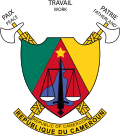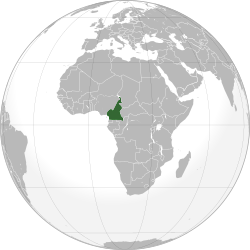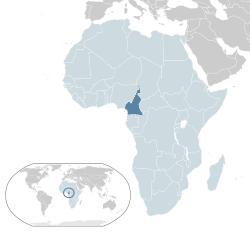Republic of Cameroon République du Cameroun (French) | |
|---|---|
| Motto: "Paix – Travail – Patrie" (French) "Peace – Work – Fatherland" | |
| Anthem: "Chant de Ralliement" (French) "The Rallying Song" | |
| Capital | Yaoundé 3°52′N 11°31′E / 3.867°N 11.517°E |
| Largest city | Douala |
| Official languages | English French |
| Ethnic groups (2022) |
|
| Religion (2022) |
|
| Demonym(s) | Cameroonian |
| Government | Unitary dominant-party presidential republic under a dictatorship |
| Paul Biya | |
| Joseph Ngute | |
| Marcel Niat Njifenji | |
| Cavayé Yéguié Djibril | |
| Legislature | Parliament |
| Senate | |
| National Assembly | |
| Formation | |
| 17 August 1884 | |
Partition | 20 July 1916 |
Independence of French Cameroon from France | 1 January 1960 |
Independence of Southern Cameroons from the United Kingdom, establishment of federal republic | 1 October 1961 |
Unitary state | May 1972 |
| Area | |
Total | 475,442 km2 (183,569 sq mi) (53rd) |
Water (%) | 0.57 |
| Population | |
2024 estimate | 30,966,105 (52nd) |
Density | 39.7/km2 (102.8/sq mi) |
| GDP (PPP) | 2024 estimate |
Total | |
Per capita | |
| GDP (nominal) | 2024 estimate |
Total | |
Per capita | |
| Gini (2021) | medium inequality |
| HDI (2022) | medium (151st) |
| Currency | Central African CFA franc (XAF) |
| Time zone | UTC+1 (WAT) |
| Date format | dd/mm/yyyy yyyy/mm/dd |
| Calling code | +237 |
| ISO 3166 code | CM |
| Internet TLD | .cm |
| |
Table of Contents
Introduction to Teacher Standards in Cameroon
The educational system in Cameroon is governed by a set of established standards that are crucial for ensuring quality education across the country. Teacher standards in Cameroon serve as a framework that dictates the necessary qualifications, competencies, and ethical considerations that educators must adhere to throughout their careers. These standards are not just arbitrary guidelines; they play an essential role in shaping the educational landscape and significantly influence student learning outcomes.
In recent years, the importance of maintaining high-quality education through robust teacher qualifications has garnered increasing attention. The national educational framework in Cameroon outlines the necessary certifications and competencies that educators are required to possess. This framework is designed to uphold the integrity of education by ensuring that teachers are not only knowledgeable in their subject areas but also proficient in pedagogical strategies that facilitate effective learning.
One of the primary objectives of establishing stringent teacher standards is to enhance the overall quality of teaching and learning in schools. Qualified educators are better equipped to engage students, impart knowledge, and inspire a passion for learning. Furthermore, certified teachers are held to a professional standard that elevates the teaching profession and fosters a culture of continuous improvement within educational institutions. Through effective qualification processes, Cameroon aims to cultivate a workforce of committed, skilled educators capable of contributing positively to student achievement.
In essence, the teacher standards in Cameroon underscore the significance of qualification and certification as pillars of a successful educational system. By prioritizing the development of qualified educators, the framework aims not only to enhance individual teaching practices but also to create an environment where students can thrive and attain their full potential. This commitment to maintaining high educational standards is imperative for the future of learning in Cameroon.
Qualifications Required for Teachers
In Cameroon, the pathway to becoming a qualified teacher involves a series of specific academic and professional requirements that vary depending on the educational level one intends to teach. Prospective teachers typically need to hold a minimum of a Bachelor’s degree in Education or a related field, which is often essential for teaching at the secondary level. For those aspiring to teach at primary schools, a diploma in teacher training, such as the Teacher’s Diploma from a recognized institution, is required.
At the secondary education level, candidates are expected to specialize in particular subjects. This specialization can be achieved through a Bachelor’s degree that is tailored to specific disciplines, such as Mathematics, Sciences, or Languages. Furthermore, a Master’s degree in Education may provide an added advantage and is often preferred by some institutions. For instance, teachers who hold advanced degrees might have better employment opportunities and could progress more swiftly in their careers.
In addition to academic qualifications, teacher certification is obligatory in Cameroon. This generally entails participating in a professional development program that facilitates the development of essential teaching skills and pedagogical knowledge. Many of these programs culminate in obtaining the Teacher’s Professional Competency Certificate, which validates the individual’s eligibility to teach.
The requirements for private and international schools may differ slightly, with certain institutions seeking additional qualifications or certifications from recognized bodies in the education sector. Lastly, it is essential for aspiring teachers to stay informed of any changes in the educational policies and standards in Cameroon, which can influence the specific qualifications required for teaching positions across various levels. Understanding these academic requirements is vital for anyone looking to embark on a teaching career in Cameroon.
Licensing Exams for Teachers
In Cameroon, aspiring teachers must navigate a rigorous process of licensing exams to be certified to teach. These exams serve as a critical assessment tool to ensure that candidates possess the necessary knowledge and skills to excel in the educational sector. The structure of the licensing exams typically encompasses various subjects relevant to the teaching profession, including pedagogy, educational psychology, and specific content areas like mathematics, language arts, or science, depending on the candidate’s intended teaching specialization.
The format of these exams may vary, with a combination of multiple-choice questions, essays, and practical demonstrations. This multifaceted approach aims to evaluate not only theoretical knowledge but also practical application and critical thinking abilities. In order to pass the licensing exams, candidates generally must achieve a minimum score, which may be set by regulatory bodies or educational institutions involved in teacher certification. This criterion ensures that only those who demonstrate a competent understanding of the required subject matter move forward in the certification process.
Frequency of the licensing exams is another essential consideration. Typically, these exams are administered annually, allowing candidates to plan their preparation accordingly. It is crucial for prospective teachers to stay informed regarding specific dates and any changes in exam policies that may impact their certification journey.
Additionally, various resources are available to assist candidates in preparing for the licensing exams. These may include preparatory courses, study guides, and online forums where aspiring teachers can exchange knowledge and strategies. Such resources are invaluable in helping candidates approach the exams with confidence, thereby enhancing their chances of success. Accessing these tools can significantly prepare them for the challenges ahead and solidify their commitment to becoming effective educators in Cameroon.
Professional Development and Continuous Learning
In Cameroon, the professional development of teachers is viewed as a crucial component in the pursuit of excellence in education. Continuous learning ensures that educators remain updated on educational best practices, innovative teaching methodologies, and evolving curricular standards. This commitment to professional growth is embodied in several programs designed specifically for teachers at various stages of their careers.
The Ministry of Basic Education, along with other educational bodies, organizes workshops, seminars, and training sessions that focus on diverse topics relevant to current teaching practices. These programs aim to not only enhance subject matter expertise but also to develop pedagogical skills that cater to the diverse needs of students. Particularly, teachers are encouraged to engage in peer collaboration, sharing resources and strategies that facilitate effective teaching.
In addition to mandatory training programs, teachers in Cameroon have access to online platforms and resources that promote continuous professional development. These tools allow educators to participate in self-paced courses, webinars, and virtual discussions, making it easier to balance their professional growth with other responsibilities. By embracing technology, teachers can stay informed about the latest trends in education, thereby improving their overall teaching effectiveness.
Furthermore, the significance of continuous learning is underscored by the dynamic nature of the educational landscape. As new challenges, including changes in curriculum and advancements in educational technology, emerge, teachers must adapt their skills accordingly. Engaging in lifelong learning not only enhances teaching practices but also contributes to a more robust and responsive educational system in Cameroon. To maintain high teaching standards, ongoing professional development should be regarded as an indispensable investment in both teachers’ careers and student outcomes.
Regulatory Bodies and Their Role
In Cameroon, the framework for maintaining high educational standards is underpinned by a series of regulatory bodies that play a critical role in overseeing teacher standards and certification requirements. The primary institution responsible for education oversight is the Ministry of Basic Education (MINEBAC), which is tasked with the governance of all aspects of primary education. It establishes policies, sets educational standards, and ensures that teachers meet specific qualifications to teach within the system.
Another important body is the Ministry of Secondary Education (MINESEC), which handles similar responsibilities for secondary education. Together, these ministries collaborate to regulate and enhance the teaching profession through implementing rigorous certification processes. They also work in conjunction with the Teacher Training Colleges (TTCs), where prospective educators receive their foundational qualifications. These TTCs are crucial in providing preservice training and are monitored by the ministries to ensure compliance with national guidelines.
Furthermore, the National Commission for the Certification of Teachers and the Cameroon Professional Teachers’ Association play vital roles in the continuous professional development of educators. These organizations are responsible for setting standards for professional conduct, ensuring that practicing teachers engage in lifelong learning, and adhering to ethical guidelines, which are essential for maintaining the integrity of the profession.
Regulatory bodies also facilitate accreditation processes for institutions that offer teacher training programs, ensuring that they meet the established educational standards. By enforcing consistent certification requirements, these organizations contribute to the overall improvement of educational quality in Cameroon, enhancing the prospects for both educators and students. As such, understanding the regulatory framework and its components is essential for anyone involved in the teaching profession in Cameroon.
Challenges in Teacher Certification and Standards
The education system in Cameroon encounters several challenges regarding teacher certification and standards, significantly impacting the quality of education delivered. One of the primary obstacles is access to training programs. Many aspiring teachers face geographic and economic barriers that limit their ability to enroll in accredited pedagogical institutions. Rural regions, in particular, are often underserved, leading to a disproportionate number of uncertified teachers in these areas. This inequitable access to training directly affects the professional development of educators, resulting in a workforce that may lack essential skills and knowledge.
Another pressing issue is the quality of educational programs offered within teacher training institutions. While some programs adhere to international teaching standards, many face criticism for being outdated or poorly structured. The curricula often do not address the contemporary educational needs or pedagogical approaches that are vital for fostering critical thinking and innovation among students. Consequently, many teachers graduate without the necessary competencies required to navigate today’s diverse classroom environments effectively.
Socio-economic factors further complicate the landscape of teacher certification in Cameroon. The low remuneration associated with teaching positions discourages talented individuals from pursuing a career in education, particularly when more lucrative opportunities exist in other fields. Additionally, societal attitudes can undermine the perceived value of the teaching profession, further impacting recruitment and retention rates. These socio-economic challenges not only affect teacher qualifications but also contribute to high attrition rates, leaving schools with a scarce pool of qualified professionals.
Addressing these challenges requires a multifaceted approach, including policy reforms and increased investment in educational infrastructure. By improving access to quality training programs and supporting socio-economic conditions for teachers, Cameroon can work towards establishing comprehensive standards that enhance the overall effectiveness of its education system.
Impact of Teacher Standards on Student Performance
Teacher qualification standards play a critical role in shaping the educational landscape in Cameroon. The correlation between well-qualified teachers and improved student performance is substantiated by numerous studies and statistical data. Research has consistently shown that effective teaching is one of the most significant factors influencing student learning outcomes. In Cameroon, where educational challenges persist, the necessity for robust teacher standards becomes even more evident.
A report published by the Global Partnership for Education (GPE) indicates that students taught by certified teachers exhibit significantly higher performance in assessments compared to their peers taught by unqualified personnel. For instance, the data revealed that standardized test scores in mathematics and reading were markedly higher among students whose teachers met the established qualification criteria. This finding underscores the importance of rigorous certification processes, which ensure that educators possess the necessary pedagogical skills and content knowledge to facilitate effective learning.
Moreover, a 2021 study by the Ministry of Education in Cameroon highlighted that schools with a stronger emphasis on teacher qualifications tended to experience lower dropout rates and higher graduation rates. In these institutions, a comprehensive understanding of curriculum and effective teaching methodologies among educators translates directly into enhanced student engagement and motivation. Through supportive teaching practices, well-qualified teachers foster an environment conducive to learning, thereby increasing the likelihood of academic success.
In addition, teachers who meet the certification standards often participate in ongoing professional development. This continuous learning helps them stay abreast of the latest educational trends and innovative strategies, which further benefits their students. Professional development ensures that educators are equipped to address various learning styles and needs within diverse classroom settings, ultimately leading to improved educational outcomes.
In conclusion, the implementation of stringent teacher qualification standards is crucial in improving student performance and overall educational quality in Cameroon. By prioritizing the recruitment and retention of well-qualified teachers, the education sector can make significant strides toward ensuring that all students receive the quality education they deserve.
Success Stories from the Field
In recent years, several schools in Cameroon have exemplified the positive impact of stringent teacher standards and enhanced certification processes on education quality. One such institution is the Lycée de Yaoundé, where dedicated teachers have embraced innovative teaching practices that align with the national curriculum while inspiring students to excel in their studies. A significant factor contributing to their success is the professional development programs they engage in, which encourage educators to continually refine their skills and pedagogical methods.
One exemplary teacher, Ms. Aissatou, has successfully integrated technology into her classroom, utilizing digital tools to foster interactive learning experiences. Her approach not only makes complex subjects more accessible to students but also cultivates essential digital literacy skills, which are increasingly important in today’s job market. The positive feedback from her students has underscored the effectiveness of well-trained teachers in creating an engaging learning environment.
Another inspiring account comes from the Government Primary School in Douala, where Mr. Nkong has been recognized for his community-oriented teaching strategy. He encourages students to participate in local projects, thereby instilling a sense of responsibility and relevance concerning their education. By aligning classroom learning with community needs, Mr. Nkong exemplifies how certified teachers can tread the line between academic standards and real-world application, enhancing students’ overall learning experience.
Additionally, the impact of the national teacher certification process in schools has led to a marked improvement in student performance across various subjects. As stakeholders acknowledge the reciprocal relationship between teacher qualifications and student achievement, more institutions are advocating for adherence to robust teacher standards. The success stories from Lycée de Yaoundé and Government Primary School highlight the critical role of competent teachers in shaping educational outcomes in Cameroon, illustrating the benefits of well-regulated teacher qualifications.
Conclusion and Future Directions
In conclusion, the effective understanding of teacher standards and certification requirements in Cameroon is crucial for facilitating a robust educational framework. Throughout this discussion, we have explored the various dimensions of teacher standards, from the initial certification processes to ongoing professional development initiatives. The emphasis on maintaining high teacher standards not only enhances the quality of education but also fosters a culture of accountability and excellence among educators.
Upholding teacher standards is essential in ensuring that educators are well-equipped to meet the diverse needs of students. As we have seen, effective teacher certification processes are not merely administrative hurdles; they are pivotal in establishing a competent workforce that can navigate the complexities of modern classrooms. Furthermore, the dialogue on teacher standards and certification reflects a broader commitment to educational reform and improvement in Cameroon.
Looking towards the future, there are promising developments on the horizon regarding teacher certification and professional growth opportunities. The integration of technology in teacher training programs, coupled with an increased focus on continuous professional development, can enhance the capacity of educators to adapt to evolving educational demands. There is a growing recognition of the need for flexible certification pathways that accommodate various professional experiences and expertise. This can significantly contribute to diversifying the teaching workforce and improving the overall quality of education.
Ultimately, as Cameroon continues to invest in teacher standards and certification processes, the long-term benefits will extend beyond individual educators. A well-structured professional development framework, alongside rigorous certification standards, will contribute to a more effective educational system capable of nurturing the next generation. Such advancements will not only elevate the quality of teaching but also promote student achievement and social equity within the education sector.



